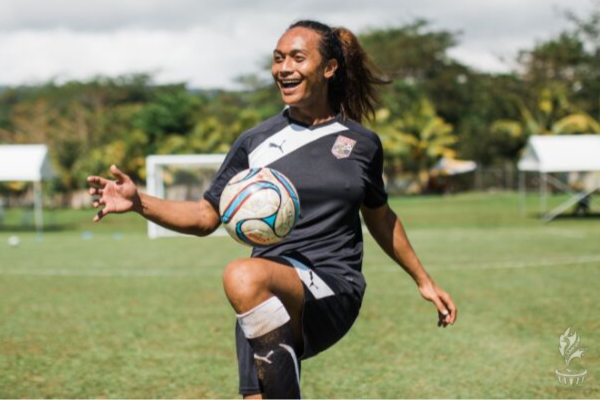World’s first transgender footballer proud to be ‘home’ for Pacific Games
American Samoa’s Jaiyah Saelua made headlines in 2011 when she became the first transgender footballer to play in a FIFA men’s world cup qualifying match. After a break from the international sporting stage, she is back in action at the Samoa 2019 XVI Pacific Games, where her side are making headlines themselves.
On Friday, American Samoa ended a 36-year losing streak at the Games when they drew 1-1 with Tuvalu. It was the latest in a series of improving results for a team once branded the worst in the world after a 31-0 loss to Australia in a FIFA world cup qualifying match in 2001, and later made famous in an internationally released documentary film, Next Goal Wins.
Saelua, one of the main characters in the film, has spent the past few years travelling the world to promote it and to tell her story as a trailblazing fa’afafine, a Samoan term for non-binary members of the community who behave in a range of feminine ways.
Read more:

Jaiyah Saelua represents American Samoa's men's football team with pride and has made a comeback for Samoa 2019 (Credit: Pacific Games News Service)
Fa’afafine have been an integrated part of Samoan culture for centuries, and the word roughly translates as someone who lives ‘the way of a woman’.
The Pacific’s cultural acceptance of fa’afafine is a true example of love and tolerance towards difference that is not seen in some other parts of the world, and sets the perfect stage for Saelua’s return to international competition.
The 30-year-old, who officially commenced her transgender transition after the 2011 world cup qualifiers, took six years off professional football.
She returned home to American Samoa two years ago to train with the national side, and confirmed that her motivation to get back into football was inspired by the changes made by the Football Federation of American Samoa, in particular on youth development in the sport.
The centre back credits this investment for her team’s improved performances at Samoa 2019. As well as the historic draw with Tuvalu, American Samoa lost 5-0 to New Caledonia and 9-0 to Fiji, but there are strong signs of progress.
“The defence was good,” Saelua told the Pacific Games News Service. “Against New Caledonia we only let in three goals, not counting the two penalties, and against Tuvalu, who have beaten us 4-0 in the past, we had it.
“Our offence (attack) needs a lot of help, but that is all part of our development, and we are taking steps forward.”
Thanks to the passion of her young teammates who are representing their country for the first time and unscarred by past thrashings, Saelua truly believes American Samoa could come away with an historic win in Apia, which would be their first at a Pacific Games since 1983.
And as someone who has played and travelled all over the world but not always been understood and accepted as a fa’afafine in men’s football, Saelua says the welcoming response at Samoa 2019 makes it incredible to be home.
“This time, the supporters who understand the concept of fa’afafine, the officials, and coaches of other teams are encouraging. It makes me feel proud to be a part of the Pacific region where this third gender is accepted, encouraged and celebrated," she told the Pacific Games News Service.
When asked what message she would like to share with young people across the Pacific and beyond, Saelua said: "Whether you are a little girl, whether you are a disabled person, whether you are a person of colour, whether you are transgender or gay, bisexual, it doesn’t matter.
“If you have a passion to play football, go out and play. We live in a community and a society that accepts minorities, and we are a minority in the world. Even in our region we face discrimination but the positive always outweighs the negative at home, and we are home. Whatever people say about you, be proud of it, and use it to motivate you to be the best you can be.”
American Samoa takes the field again on Monday 15 July against Solomon Islands at JS Blatter Football Complex, Faleata. Entry is $5 and free for children aged 15 years and under.



